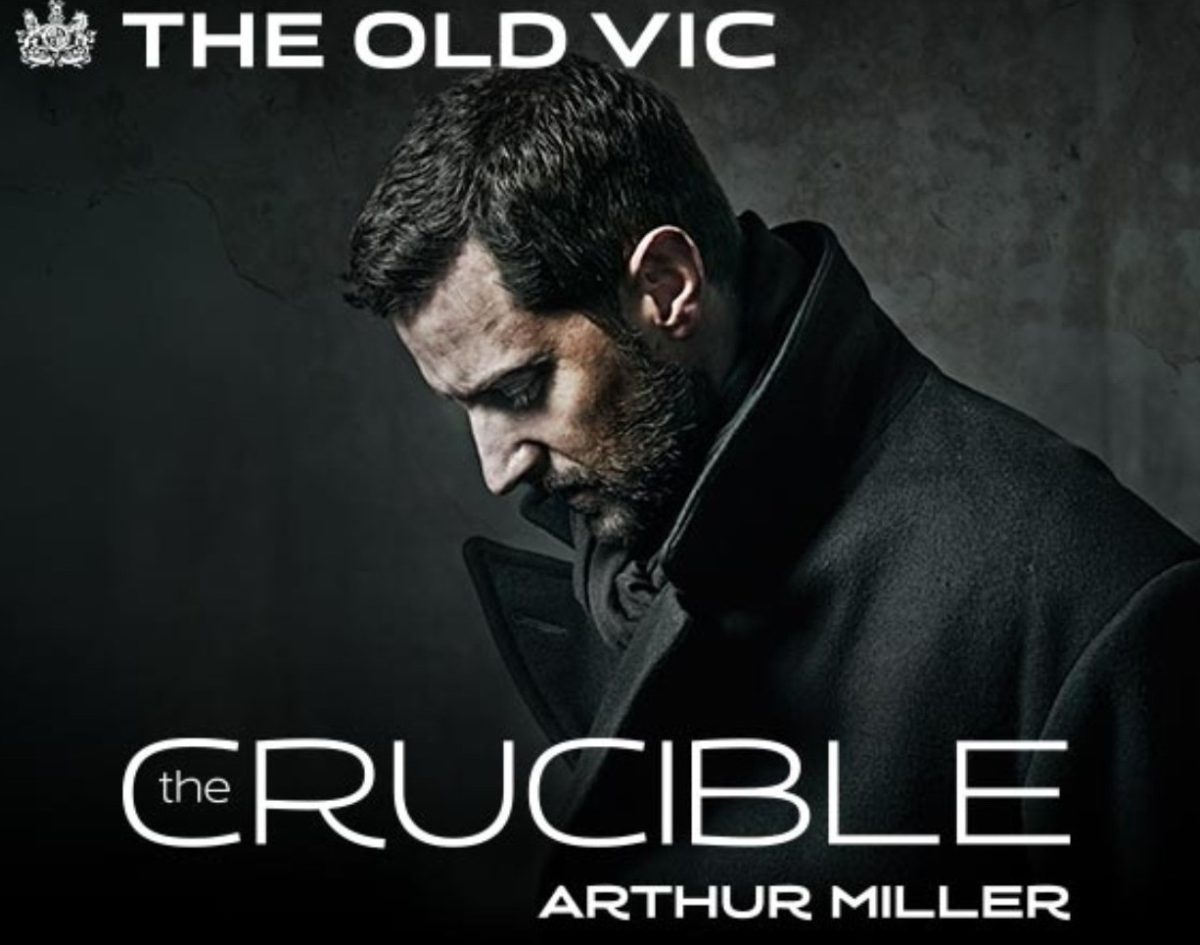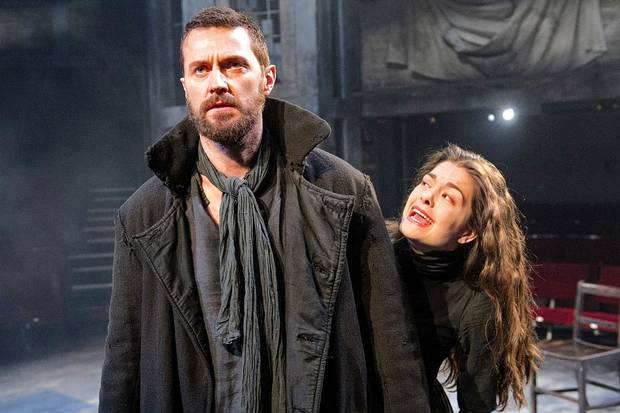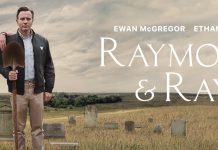This is part two of the Richard Armitage in Conversation Transcript. You can read the first one here.
MW: I think people are curious that after a Wednesday and Saturday matinee, you have a very quick turnaround. How do you perform again in an hour? Do you have a huge breakfast?
RA: The resolution which I have adopted is not drinking. You just have to plan your day and we all do a warm up together, a vocal warmup. You just take it step-by-step. There was a point where I thought I might be able to do a version of the show, a matinee version, which is sort of like a marked version, but it’s simply not possible. The play grabs you by the throat and no matter how much you think ‘I have got to do another one’ you can’t, you just have to play it beat, by beat, by beat. Anna who plays Elizabeth, we looked at each other before the beginning of a matinee and she said to me, “I am going to bring a chair onto the stage with me and see what happens next.” But it’s what Yael always says to us, ‘Let the play happen to you. You can’t decide how you are going to play the play. You have to take it step by step and indeed the play happen to these characters and if you let that happen, you will find yourself in the second show on a Saturday night with a massive rush of energy and the ability to play that final scene.’
MW: So on Sunday, do you sleep all day…?
RA: I’m at the gym at 8 o’clock on a Sunday! (Giggles)
MW: Did you go to Massachusetts? Did you tour around there?
RA: I did. I always wanted to go to Salem for many, many years, simply because I read the play and I was fascinated, but there was never the right opportunity, so this of course this was the perfect opportunity. I drove and I got there as the sun was setting strangely on a really beautiful, spring evening, so in that line in the play where John says “Massachusetts looks beautiful in the Spring” I know what that looks like because I went there in that moment, when the sun was setting and that’s why I do those things because it’s like programming your sense memory full of images that you would never normally have. I saw the place where Proctor’s house was, I saw the brook that runs by his field, I saw the clearing in the woods where supposedly the girls danced and the pathway where Proctor walked from Salem village to Salem town. Rebecca Nurse’s house is quite complete in its construction and there’s a tiny child’s cot in the house, which I took photos of and brought back for Anna. There was just something about the child’s cot, with the puppet… All of these things just help you to focus your mind when you are about to enter into Act Two. I can close my eyes and I know where he was seated, I know where he’s been, especially when he says “I have been planting seeds near the forest edge,” that’s true, but I think there’s a moment that he takes before he comes back into his house and he has a place where he goes to contemplate and I know where that is because I went there. It enriches you so that you do have an image of what you are thinking.
MW: It is very easy to think of John Proctor as a symbol, one that is written about in essays, but you play first and foremost the character, tell us about the decision to play him in three dimensions and not as a symbol…
RA: I never got to the point where I discovered this symbol of him. I, of course, look at him as primarily a person who in that time is all about what they do. Survival was first and foremost his priority, his life, the toils of puritans in that period of time were excruciating and their lives were extremely difficult and that was the primary starting point for me. Trying to replicate that was something we were working on quite acutely in the rehearsal room because we have a very easy life and to try and disregard that and figure out what happens to these people on a day to day basis was really important. We worked on lots of physical exercises, mine was sharpening an axe for four hours and really the first few minutes you think ‘I know how to sharpen an axe’ and then after four hours you think ‘Ok, I really know how to sharpen an axe.’ When I was in America visiting Salem, I went to a farm and I worked for a couple of days with cows… mucking out cows, sweeping out their urine and just getting a sense of what that daily toil would have been. Then you find the body of the character and then you can figure out what Miller starts to put into his mind and his heart.
MW: It’s interesting that it talks about McCarthyism, but what’s more interesting I think is the way it’s relevant to what is happening right now. That must be so fascinating to play eight times a week?
RA: It is. Also the genius of his playwright is that he knew that when he was writing about McCarthyism, that he wasn’t just writing about this period of his life, which is why he wrote a parable or whatever it is, he knew people would be revisiting this piece of work again and again and again. Part of the preparation for me, for the play, is to come in everyday an hour early and I read quite a few letters from people and I have a letter that I want to share a small piece of. I’m not going to say who wrote it, but it really touched me… (Reads a letter from an individual who grew up on the outskirts of Berlin and made references to the knocking down of the wall and asking the person’s father about TV programmes they were able to watch and all of the problems of the 1950s).
I get a letter like this probably everyday from somebody somewhere… I had a letter from a young boy who is living in Gaza at the moment who feels the same thing. He hasn’t seen the play, but he has been on the internet and he’s googled the content of the play and the responses of people to it and the letter is still here and it will be here for some time, which is why the liberty and the freedom we enjoy in the United Kingdom is hard won, but must be defended. There is always that looming shadow that will eventually find a foothold in times of crisis and gives us the potential to do to each other these terrible things that Miller refers back to in 1692. (Receives a long round of applause from the audience).
MW: Given the depth of the people and their experiences, going into the last eleven days, is there a sense of sadness that it’s coming to an end or a sense of satisfaction?
RA: It’s a bit of both actually. There’s a sense of ‘How many more? How many more have I got left in me?’ I do feel run through at the end of a show. I always think ‘I don’t know if I can do another one,’ yet you find the ability to do another because I read that letter before the show. I do think that on behalf of the Company that there is a sense of a job well done, but we can always go further and it’s something that Yael has installed in us from the beginning. Even on that last performance, I will still be picking up that script and looking to see if there’s something else I have missed, something we haven’t quite found. In a long run like this, well it isn’t that long as it’s 12 weeks, but the best thing you can have is a new idea every night, whether it’s one idea or a new line that you have never heard before and thankfully I hear new things every time that I perform this play…. a new idea or a new word will hit me and that’s because as a Company of 23 people, who have been absolutely committed to the play from the beginning, no one comes in half-heartedly and no one’s on their phone in the interval, everyone is absolutely there.
MW: Some questions were submitted and in our remaining ten minutes before Richard goes to get ready for tonight’s performance, we will just throw out a couple of the questions. These are chosen at random. This one is perfect for what we have just been saying: ‘After performing such an intense role for so many weeks, would you consider doing a musical or comedy?’
RA: A musical, not! One of the projects we looked at was The Rover a short while back and it never quite happened because we couldn’t find the right venue and again the event wasn’t quite going to happen for us, so, yeah a comedy would be a great antidote to this play.
MW: Here an interesting one: ‘After such a long run, what will John Proctor leave behind?’
RA: Erm…It’s really hard to answer that question until I have started to try and leave him behind myself. There was another question that came up actually about how I put him down at the end of the night and it’s a very weird process when you come off stage because I go in the shower and wash all of the blood off, which is weirdly symbolic and I sort of say thank you for coming back and visiting me again. I sort of feel disrespectful if I try to shrug him off, throw him aside and I greet people at the Stage Door, but I am still quite bewildered – I hear noises in the distance, but I can’t quite see people because he is still sort of there and I haven’t fought that, I have let that be there because I need him again tomorrow night. I don’t know what he will leave behind, I really don’t know that yet.
MW: Here’s another one: ‘Does Mr Armitage have a favourite scene or even a line in The Crucible? Or is there one where you think, ‘thank goodness that’s over?!”
RA: I have to say one of my favourite parts of the play is the beginning of Act Two. I think Miller wrote the first Act which he calls an overture and I love music, I listen to a lot of classical music… The overture is the part where the composer demonstrates all of the themes that you are going to hear over the course of the night and Act One is such a whirlwind, it’s full of repetition and all of these themes get thrown up in the air. The beginning of Act Two, you are into this sort of very kind of painful, broken relationship that is trying to heal itself and I just love walking into the space and feeling that kind of looming danger in the air of what you had just seen in the overture and then figure out how we go on from here. You see these two characters attempting to heal their life and move forward and I love that part.
MW: Do you listen to music offstage in your dressing room to help focus you?
RA: A lot of stuff I listen to is by a composer called David Darling, who wrote a great cello suite, which I listen to a lot in the dressing room. My own stuff that I brought was Arvo Pärt and I listened to something called ‘Forty Eight Responses to Polymorphia’ by Penderecki, which is very, very disturbing! It’s violins, but it sounds like screaming and it disturbs me, which is good to bring on that sense of imbalance in the play, so that’s usually playing in the dressing room, which keeps lots of people away! They will go to knock on the door and go “Oh no… I will come back later…”
MW: Do you have a pre-show ritual gets you in the space…?
RA: I have vomited in Act Four, I have passed water in Act Four… nobody knows this… (giggles), so I don’t tend to eat too much because it finds its way back out again. I do a physical warmup, there’a a sort of ticking clock to the beginning of the play and I have found myself in a ritual, not through any sense of superstition, but because I like to switch the lights off and sit in the dark.
MW: After your 13 years away from the stage where you have been doing film and television work, where you can look at the rushes and see how you are fairing, what is it like to come back to a discipline where you can’t step outside of yourself and look at it?
RA: It’s all I ever knew. I came from a background of theatre and for a long time I found myself very uncomfortable in those first few moments before you stepped on stage where that lump comes into your throat and you’re frightened and terrified about doing it, but weirdly, coming back to it at the age that I am, 13 years later, I don’t feel the same kind of fear… I feel the engines starting to run, I feel the adrenaline rising in me. I watch the monitor just under the stage before Proctor enters at the beginning and I watch the play and I find it so disturbing when Betty screams, when she is dragged across the stage by Abigail, that scream sort of propels me into the play. All of the fear that I’m feeling is somehow channelled through that scream and taking Proctor over the stairs, of course they are in a time and place in their lives where they are full of fear, so we all bring that fear to the stage with us.
MW: This is a very harrowing play at certain times, do you guys get together afterwards?
RA: I wish I could. They get down fifteen minutes before us, so they get into the bar first, but of course I’m not drinking, so boring old me gets to go home. We haven’t but we should…
MW: By playing John Proctor, have you changed as a person? If so, how?
RA: I am sorry to disappoint the person that asked that question, but I just don’t know. I suppose I already feel changed in that I think I have opened a part of myself, or Proctor has opened a part of myself, or somehow I have opened a part of Proctor, I don’t know which part of that is, but it had frightened me before and I guess I am no longer afraid. (Huge round of applause and Armitage quickly exits the stage).
We hope you like the transcripts – they definitely took some time to do! Please feel free to leave your thoughts on the interview or play below:






























[…] From Film and TV Now. […]
Thank you SO much for doing this! I so wanted to attend but left London the day of this event.
Thank you again for sharing this!
What bad timing! You are welcome! 😉
[…] […]
Thanks so much for sharing this !
Well done Lisa I was at this event and you have captured it beautifully. I can read it and see him on stage looking so relaxed and thoughtful. It was a special evening.
Thank you! Glad you enjoyed reading it. 🙂
Thanks for this meticulous script of the conversation! Very insightful!
Your effort is much appreciated by those of us overseas who could not make the play or the talk. Thankyou.
Thank you for this interview. Very good and interesting questions and of course the cognitive and emotional responses.
Thank you so much for writing this all up. One question though: I seem to remember – and friends who were present too confirm this – that Richard talked about a couple of political matters, such as Guantanamo, the extreme right-wing a.s.o. Why have these things been edited out? And will we at some point have the opportunity to see the complete video of this conversation? Thank you!
Yes, he did. Unfortunately, I couldn’t capture that part clearly on the dictaphone and I didn’t want to generalise it if it wasn’t completely accurate. 🙂 The video of it was recorded by the people at the Old Vic themselves, so I am afraid I can’t be much help with that bit!
Richard is so intense and serious in his approach to the theater works. I wonder if it just him or most actors who do block buster movies and TV would do the same amount of work to the stage. Thank you Lisa-Marie Burrows for the hard work in transcribing. If only there were an accompanying video hahaa…
Thank you for all your efforts! It’s really nice to read it again. I saw The Crucible again after this interview and when John talked about the spring in Massachusetts I swear I saw it!
May I add Richard mentioning the German dancer & choreographer Pina Bausch as an inspiration for the physicality in The Crucible. As a dancer that caught my attention. I’d also like to add that the questions about TV programmes in Berlin where asked by the Stasi to check up on this person’s parents.
Anyway, thank you for sharing this!
Oh, and that harrowing play mentioned in the penultimate question is A streetcar named desire which is being performed in The Young Vic down the road. Richard’s answer makes more sense when you know this. Sorry to be nitpicking…
Terrific! I missed some of his remarks, so it was great to read what I missed HERE! Cheers!
Thank you for preparing and posting these transcripts. For the many who were unable to attend, it is very interesting to read the questions and replies. Thank you for conducting the interview so professionally and for sharing it with us!
Thank you, it was a very interesting interview and you did a great job.
Thank you for transcribing this! It could not have been easy to capture all of the questions and answers! A very thoughtful interview.
Thanks a lot for doing this for us who couldn’t attend.
[…] In Conversation with Richard Armitage transcripts Part 1 & Part 2 […]
Thank you for this transcription, it’s very much appreciated. As with Popcorn Taxi in Sydney in 2013, Richard is a delight in these conversations – considered, funny and generous with his thoughts about his craft.
You’re welcome. We are pleased you enjoyed reading it. 🙂
[…] Richard Armitage In Conversation – Transcript (Part 2) […]
[…] https://www.filmandtvnow.com/richard-armitage-conversation-transcript-part-one/ https://www.filmandtvnow.com/richard-armitage-conversation-transcript-part-two/ […]
Comments are closed.